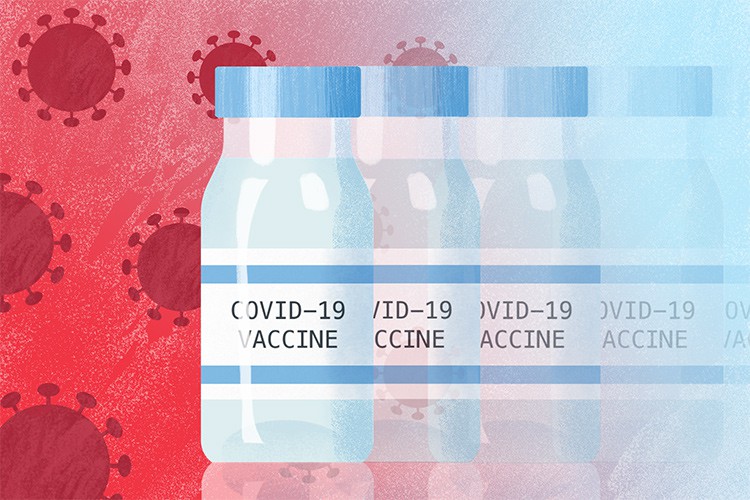
31 January 2022
Illustration: Lisa Nelson
In a second recent ruling dealing with Covid in the workplace, the Commission for Conciliation, Mediation and Arbitration (CCMA) has ruled once again that suspending an employee for refusing to be vaccinated was fair and in line with the Occupational Health and Safety Act.
Commissioner Petrus Venter ruled that the Act compelled employers to provide safe workplaces, and the requirement to vaccinate was in the interests of the health and safety of all employees.
Gideon Kok, a security officer at Ndaka Security Services, which provides security for Sasol Ltd in Sasolburg, was suspended after he refused to be vaccinated on religious grounds.
He was given the option of providing a weekly Covid test, but he only did this a few times. He then refused because he had to pay for the testing himself. He was suspended in November last year.
Kok claimed this was an unfair labour practice and that the requirement that he be vaccinated contravened his rights to freedom and security.
In his ruling, Commissioner Venter said Kok had been instructed to only return to work after he had been vaccinated, or when he submitted his weekly test result.
Evidence during the hearing was that Ndaka, in terms of directives by the Minister of Employment and Labour, had undertaken Covid risk assessments during which Kok had been identified as an employee who needed to be vaccinated.
This was because he shared an office on site at Sasol with ten other employees and worked in close contact with others.
Kok had previously contracted Covid and contact tracing revealed that it was highly probable that several colleagues had been infected by him. The entire office had to be closed and employees had to self-isolate.
The company said every employee in the company had been assessed. The use of space in offices had been a crucial factor in their approach to Kok.
Regarding other employees who were not vaccinated, two were at home under the “no work, no pay principle”, one had been accommodated in an isolated office, and another was submitting weekly test results.
The company said it was not possible to allow Kok to work from home or in an isolated office because he had had to deal with guards, the client and the public.
The company was under pressure from Sasol to achieve a 100% vaccination rate as Sasol was a primary client.
Kok, in his evidence, said his suspension was unfair because there was no legislation in place that compelled anyone to be vaccinated.
He said he was a devout Christian and he had already recovered from Covid. He initially took medication, but he claimed that he only recovered when he started to rely on his body’s natural immunity and his faith.
The vaccination, he said, was “still in the experimental stage” and would not prevent the spread of the virus, nor was it a cure. [Editor’s note: Covid vaccinations are the most tested medical intervention in history and vaccination has been shown to reduce the risk of infection.]
Commissioner Venter said Kok’s access card was blocked after extensive attempts to persuade him to get vaccinated. The decision was not taken on a whim and due process had been followed.
“The past few months have seen high level debates and discussions on whether or not vaccinations should be mandatory in the workplace. At the centre of the debate is the conflicting constitutional rights, coupled with moral and ethical opinions,” said Venter.
“It appears that important institutions, such as the South African Human Rights Commission did an about-turn when they recently announced that compulsory vaccinations might be lawful under certain circumstances. It appears that Nedlac holds the same view.”
Commissioner Venter said President Cyril Ramaphosa had made reference to occupational health and safety laws and a safe working environment and it was announced that Cabinet was investigating the possibility of a mandatory vaccine.
Kok was relying on his constitutional rights and any infringement would have to be based on compelling reasons.
The commissioner said the vaccination had shown a demonstrable success in limiting severe illness and transmission, and Kok had not been able to present any evidence to the contrary.
The chances of adverse effects from the vaccination were extremely small.
“The company and Sasol do not require vaccination to protect only him…the aim is to ensure a safe working environment for everyone.
“He relies on his religion, this is baseless and without any support, theological or scientific,” said the commissioner.
Commissioner Venter said the company had complied with the Minister’s directives, which did not make vaccination mandatory but placed the onus on the employer to take into account its general duties under the Occupational Health and Safety Act.
This encompassed the common law principle of a safe working environment and imposed a statutory duty on employers to take reasonable and practical measures to ensure a healthy and safe workplace.
“The Act goes further, it determines that every employee at work must cooperate with an employer to obey health and safety rules,” the commissioner said.
“I have little doubt that the requirement to vaccinate is nothing less than a ‘reasonable and practical step’ that every employer is required and compelled to take,” he said.